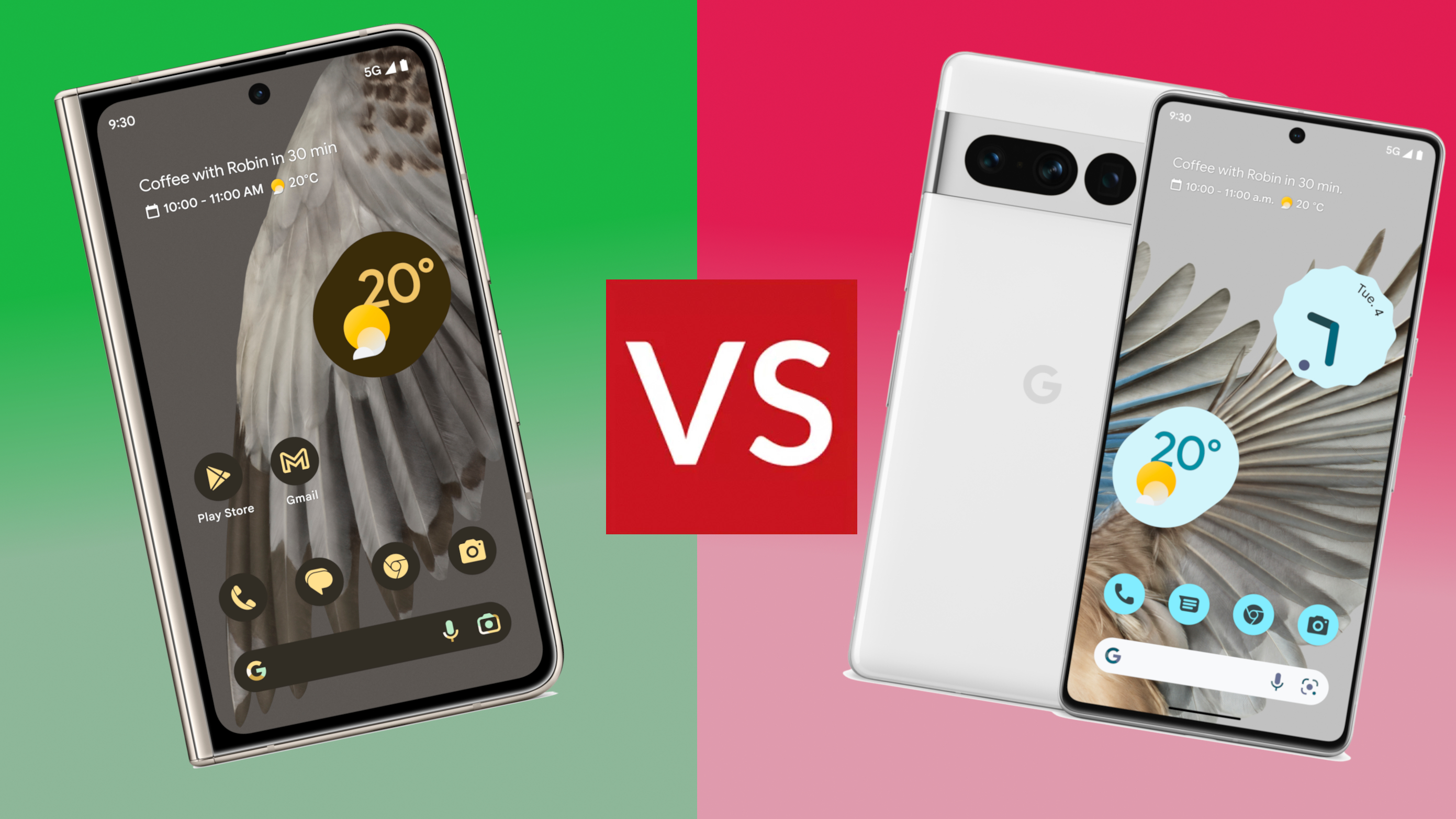Google Pixel Fold vs Google Pixel 7 Pro: should I upgrade?
If you're already rocking the Pixel 7 Pro, is the upgrade to Google's first foldable phone worthwhile?

Get all the latest news, reviews, deals and buying guides on gorgeous tech, home and active products from the T3 experts
You are now subscribed
Your newsletter sign-up was successful
The release of the Google Pixel Fold signalled the companies' first foray into the world of foldable phones. It's also the first handset in the Pixel range to sit above the Google Pixel 7 Pro, making it the new flagship for the brand.
That could leave many Pixel 7 Pro users wondering if they should upgrade to the Pixel Fold. Let's take a closer look.
Google Pixel Fold vs Google Pixel 7 Pro: Price
There's not a lot to say here. The Google Pixel 7 Pro is one of the best value propositions in the Android phone sphere, retailing from just £849 in the UK. Shop around though, and you'll often find a better deal than that.
By comparison, at £1,749, the Pixel Fold is the best part of £1,000 more expensive than the Pixel 7 Pro. That's certainly not an insignificant sum. Of course, that's pretty easy to justify – there's a whole folding mechanism and twice as many screens on board, for starters!
But when it comes down to it, that's still going to be a pretty tough pill to swallow for many. On paper, the two aren't markedly different, either, as we'll get into now.
Google Pixel Fold vs Google Pixel 7 Pro: Display
The new Pixel Fold packs in a pretty sweet array of displays. The cover display is a 5.8-inch OLED panel. It features an adaptive 120Hz refresh rate, an Always-On Display and up to 1,550 nits of peak brightness.
Those impressive specs are continued on the internal screen. Here, a 7.6-inch panel offers a 6:5 aspect ratio, packing a 2208 x 1840 resolution. That also packs a 120Hz adaptive refresh rate and – somewhat bizarrely – the Always-On Display.
Get all the latest news, reviews, deals and buying guides on gorgeous tech, home and active products from the T3 experts
The Pixel 7 Pro may only have the one screen, but it's certainly not lacking in quality by comparison. The 6.7-inch QHD+ OLED panel packs in a monstrous 3120 x 1440 resolution for crisp, sharp imagery. It also packs an adaptive 120Hz refresh rate and is good for 1,500 nits of peak brightness.
Picking a winner here is tough. While the Fold obviously has more screen real estate overall – and two to choose from – in terms of quality, there's practically nothing to separate the two.
Google Pixel Fold vs Google Pixel 7 Pro: Design
The Pixel 7 Pro has become something of a modern classic in the Android phone sphere. It's design, with the camera car extending from side-to-side, is arguably one of the best – certainly one of the most interesting – on the market.
The Pixel Fold draws heavily from this design for its own casing. That camera bar is shortened into more of a module, though. That might be a feature you prefer – personally I think the full-length bar is more aesthetically pleasing, but neither is offensive.
The Pixel Fold has been engineered to be thin, in a bid to make the device more manageable. That means, when folded, it sits 12.1mm thick. That is larger than the Pixel 7 Pro – which sits 8.9mm thick – but not substantially so. When unfolded, the Pixel Fold is just 5.8mm thick.
Google Pixel Fold vs Google Pixel 7 Pro: Cameras
The Pixel 7 Pro has taken on a bit of a cult status for its camera. That's with good reason – it is truly fantastic, and takes some really beautiful images.
That camera goodness comes from a trio of rear sensors. There's a 50MP main sensor, a 48MP Quad Bayer telephoto and a 12MP ultrawide. Users get 5x optical zoom and 30x Super Res Zoom.
The Pixel Fold is not far behind. The main sensor is a 48MP Quad Bayer here, paired with 10.8MP units for ultrawide and telephoto duties. 5x optical zoom is still present and correct here, but the Super Res Zoom is limited to just 20x.
It's a close call, then, but on paper, it would seem that the Pixel 7 Pro just about edges it. As we know, though, the specs are only half the battle here. Google make brilliant use of AI in their photography system, and can use that impressively to boost an otherwise uninspiring spec sheet.
Google Pixel Fold vs Google Pixel 7 Pro: Hardware
When it comes to internal hardware, the Pixel 7 Pro and the Pixel Fold are pretty much identical. Both boast Google's in-house Tensor G2 chipset, alongside the Titan M2 security processor.
Both pack 12GB of RAM, though the Pixel Fold starts with 256GB of storage. The Pixel 7 Pro starts at 128GB, with options to boost that to 256GB or 512GB, as needed.
In terms of battery, the Pixel 7 Pro beats the Fold. It features a 5,000mAh battery, compared to a 4,821mAh unit on the Fold. However, both are rated for 24 hours of use, with up to 72 hours on the Extreme Battery Saver mode.
I'd be intrigued to see if this works out in practice. Given that the Fold has more screens to power, you'd expect it to consume more energy than the Pixel 7 Pro.
Google Pixel Fold vs Google Pixel 7 Pro: Which wins?
On paper, the Pixel 7 Pro is the clear winner here. You get a bigger battery, the same internal hardware and arguably a more rounded camera system. That alone would make it a close call, but factor in the near £1,000 price difference and it seems like a no brainer.
But of course, it's never that simple. Yes, the Pixel Fold is expensive, but you're paying for the emerging technology. Foldable phones are cool, and this boasts one of the best spec sheets on any of them. If you're desperate to buy into that world, or simply love having the latest technology, the Pixel Fold is a fine choice.

Sam is an award-winning journalist with over six years of experience across print and digital media. As T3’s Senior Staff Writer, Sam covers everything from new phones and EVs to luxury watches and fragrances. Working across a range of different social media platforms alongside his written work, Sam is a familiar face for fans of T3. When he’s not reviewing snazzy products or hunting for stellar deals, Sam enjoys football, analog photography and writing music.
